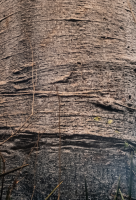 António Ole: Vital Matter gathers works from different periods of António Ole's (Luanda, 1951) multifaceted artistic journey of over fifty years. Made in various media, from sculpture to photography, from drawing to video, these works highlight the attention that Ole has devoted to nature and its vital elements and materials. The earth, water, fire and air here take on countless forms that, as a whole, invite a planetary perception and an ecological awareness not only of the cohabitation, but, above all, of the interdependence between human and non-human forms of life (animal, vegetable, mineral) – vital matter to whose urgency the pandemic itself has, more than ever, alerted us.
António Ole: Vital Matter gathers works from different periods of António Ole's (Luanda, 1951) multifaceted artistic journey of over fifty years. Made in various media, from sculpture to photography, from drawing to video, these works highlight the attention that Ole has devoted to nature and its vital elements and materials. The earth, water, fire and air here take on countless forms that, as a whole, invite a planetary perception and an ecological awareness not only of the cohabitation, but, above all, of the interdependence between human and non-human forms of life (animal, vegetable, mineral) – vital matter to whose urgency the pandemic itself has, more than ever, alerted us.
I'll visit
27.04.2021 | by Ana Balona de Oliveira
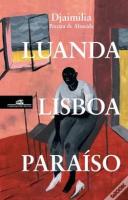 What Djaimilia Pereira de Almeida writes can be understood as a powerful transformation tool regarding the Portuguese human landscape. With it, the painful fragments of a history made up of frustrations and disappointments, of ruptures and withdrawals and of ambiguous felling are not erased, instead they are reunited in a healing coexistence.
What Djaimilia Pereira de Almeida writes can be understood as a powerful transformation tool regarding the Portuguese human landscape. With it, the painful fragments of a history made up of frustrations and disappointments, of ruptures and withdrawals and of ambiguous felling are not erased, instead they are reunited in a healing coexistence.
To read
01.01.2019 | by Inocência Mata
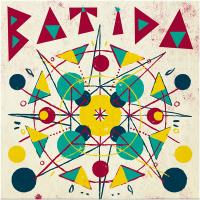 We are at the Batida workshop. A space in a garages complex in Lisbon. On the outside it’s just that. A building with nothing that distinguishes it from the others. Inside there is Pedro Coquenão, or DJ Mpula, or the man who invented Batida. Inside there, this 37-year-old Portuguese man born in Huambo (Angola), which he left with the onset of civil war, an Angolan living in Portugal since then, talks non-stop about all that Batida means. We could even say that we do not need to hear everything he is saying. The speakers release South African music. Scattered throughout the space we see a marimba, extemporary drums took out from diesel cans, Angolan beer “Cuca” bars, photos of Coquenão’s travels to Luanda, and drums that, in concert, will be illuminated from the inside as efficient do-it-yourself scenery. All this is Batida.
We are at the Batida workshop. A space in a garages complex in Lisbon. On the outside it’s just that. A building with nothing that distinguishes it from the others. Inside there is Pedro Coquenão, or DJ Mpula, or the man who invented Batida. Inside there, this 37-year-old Portuguese man born in Huambo (Angola), which he left with the onset of civil war, an Angolan living in Portugal since then, talks non-stop about all that Batida means. We could even say that we do not need to hear everything he is saying. The speakers release South African music. Scattered throughout the space we see a marimba, extemporary drums took out from diesel cans, Angolan beer “Cuca” bars, photos of Coquenão’s travels to Luanda, and drums that, in concert, will be illuminated from the inside as efficient do-it-yourself scenery. All this is Batida.
Stages
04.06.2012 | by
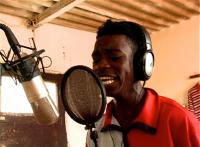 This article explores the role of Kuduro, the popular Angolan electronic music and dance style in the process of updating the national Angolan identity called angolanidade to the conditions of the new millennium.
This article explores the role of Kuduro, the popular Angolan electronic music and dance style in the process of updating the national Angolan identity called angolanidade to the conditions of the new millennium.
Stages
27.05.2012 | by Nadine Siegert and Stefanie Alisch
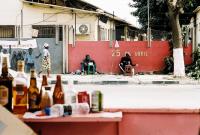 Luanda 2005. Some predators arrive possessed by amino acids of opportunities. It is the beginning of a series of projects and businesses, the rules are drawn with which wild capitalism will be mercilessly ingrained. Consolidated peace, will and dynamism, spirit of reconstruction. One invests in the country with economic growth potential, rich in natural resources where no one is out to lose.
Luanda 2005. Some predators arrive possessed by amino acids of opportunities. It is the beginning of a series of projects and businesses, the rules are drawn with which wild capitalism will be mercilessly ingrained. Consolidated peace, will and dynamism, spirit of reconstruction. One invests in the country with economic growth potential, rich in natural resources where no one is out to lose.
City
01.10.2010 | by Marta Lança
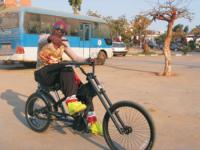 Kuduro sprang up Luanda's musseques (shanty towns) and spread rapidly through the Kandongueiros (street vendors or hawkers). New music appears on a daily basis, feeding Luanda's vocabulary with new expressions, new beats and new moves. This frenetic creation of urban languages plays an important role in today's Luanda, especially among the younger city dwellers.
Kuduro sprang up Luanda's musseques (shanty towns) and spread rapidly through the Kandongueiros (street vendors or hawkers). New music appears on a daily basis, feeding Luanda's vocabulary with new expressions, new beats and new moves. This frenetic creation of urban languages plays an important role in today's Luanda, especially among the younger city dwellers.
Stages
11.06.2010 | by Francisca Bagulho
 António Ole: Vital Matter gathers works from different periods of António Ole's (Luanda, 1951) multifaceted artistic journey of over fifty years. Made in various media, from sculpture to photography, from drawing to video, these works highlight the attention that Ole has devoted to nature and its vital elements and materials. The earth, water, fire and air here take on countless forms that, as a whole, invite a planetary perception and an ecological awareness not only of the cohabitation, but, above all, of the interdependence between human and non-human forms of life (animal, vegetable, mineral) – vital matter to whose urgency the pandemic itself has, more than ever, alerted us.
António Ole: Vital Matter gathers works from different periods of António Ole's (Luanda, 1951) multifaceted artistic journey of over fifty years. Made in various media, from sculpture to photography, from drawing to video, these works highlight the attention that Ole has devoted to nature and its vital elements and materials. The earth, water, fire and air here take on countless forms that, as a whole, invite a planetary perception and an ecological awareness not only of the cohabitation, but, above all, of the interdependence between human and non-human forms of life (animal, vegetable, mineral) – vital matter to whose urgency the pandemic itself has, more than ever, alerted us.  What Djaimilia Pereira de Almeida writes can be understood as a powerful transformation tool regarding the Portuguese human landscape. With it, the painful fragments of a history made up of frustrations and disappointments, of ruptures and withdrawals and of ambiguous felling are not erased, instead they are reunited in a healing coexistence.
What Djaimilia Pereira de Almeida writes can be understood as a powerful transformation tool regarding the Portuguese human landscape. With it, the painful fragments of a history made up of frustrations and disappointments, of ruptures and withdrawals and of ambiguous felling are not erased, instead they are reunited in a healing coexistence.  We are at the Batida workshop. A space in a garages complex in Lisbon. On the outside it’s just that. A building with nothing that distinguishes it from the others. Inside there is Pedro Coquenão, or DJ Mpula, or the man who invented Batida. Inside there, this 37-year-old Portuguese man born in Huambo (Angola), which he left with the onset of civil war, an Angolan living in Portugal since then, talks non-stop about all that Batida means. We could even say that we do not need to hear everything he is saying. The speakers release South African music. Scattered throughout the space we see a marimba, extemporary drums took out from diesel cans, Angolan beer “Cuca” bars, photos of Coquenão’s travels to Luanda, and drums that, in concert, will be illuminated from the inside as efficient do-it-yourself scenery. All this is Batida.
We are at the Batida workshop. A space in a garages complex in Lisbon. On the outside it’s just that. A building with nothing that distinguishes it from the others. Inside there is Pedro Coquenão, or DJ Mpula, or the man who invented Batida. Inside there, this 37-year-old Portuguese man born in Huambo (Angola), which he left with the onset of civil war, an Angolan living in Portugal since then, talks non-stop about all that Batida means. We could even say that we do not need to hear everything he is saying. The speakers release South African music. Scattered throughout the space we see a marimba, extemporary drums took out from diesel cans, Angolan beer “Cuca” bars, photos of Coquenão’s travels to Luanda, and drums that, in concert, will be illuminated from the inside as efficient do-it-yourself scenery. All this is Batida.  This article explores the role of Kuduro, the popular Angolan electronic music and dance style in the process of updating the national Angolan identity called angolanidade to the conditions of the new millennium.
This article explores the role of Kuduro, the popular Angolan electronic music and dance style in the process of updating the national Angolan identity called angolanidade to the conditions of the new millennium.  Luanda 2005. Some predators arrive possessed by amino acids of opportunities. It is the beginning of a series of projects and businesses, the rules are drawn with which wild capitalism will be mercilessly ingrained. Consolidated peace, will and dynamism, spirit of reconstruction. One invests in the country with economic growth potential, rich in natural resources where no one is out to lose.
Luanda 2005. Some predators arrive possessed by amino acids of opportunities. It is the beginning of a series of projects and businesses, the rules are drawn with which wild capitalism will be mercilessly ingrained. Consolidated peace, will and dynamism, spirit of reconstruction. One invests in the country with economic growth potential, rich in natural resources where no one is out to lose.  Kuduro sprang up Luanda's musseques (shanty towns) and spread rapidly through the Kandongueiros (street vendors or hawkers). New music appears on a daily basis, feeding Luanda's vocabulary with new expressions, new beats and new moves. This frenetic creation of urban languages plays an important role in today's Luanda, especially among the younger city dwellers.
Kuduro sprang up Luanda's musseques (shanty towns) and spread rapidly through the Kandongueiros (street vendors or hawkers). New music appears on a daily basis, feeding Luanda's vocabulary with new expressions, new beats and new moves. This frenetic creation of urban languages plays an important role in today's Luanda, especially among the younger city dwellers. 